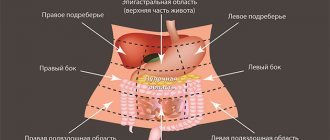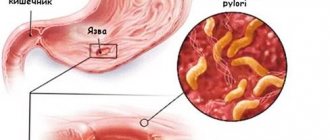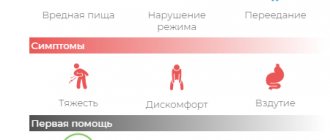Treatment of constant heaviness in the stomach and preventive measures
Heaviness in the stomach is an unpleasant sensation that occurs both due to poor nutrition and due to diseases of the gastrointestinal tract.
Quite often, the main cause of heaviness in the stomach after eating is the ingestion of a large amount of food, which is difficult for the stomach to “cope” with. There is only one solution in this case - consultation with a specialist. There is no point in self-medicating here. Uncontrolled use of pharmaceuticals can only worsen the situation. Reasons for feeling heaviness in the stomach:
- unhealthy diet (quick snacks, fast food, fatty and spicy foods);
- eating a large amount of food at one time;
- overeating (usually before bedtime);
- improper diet (eating once or twice a day);
- eating dishes consisting of foods that take a long time to digest or that are incompatible with each other;
- eating under stress;
- the presence of gastrointestinal diseases (gastritis, pancreatitis, peptic ulcer and cholelithiasis).
As for the feeling of heaviness in the stomach during pregnancy, the reasons are somewhat different. Read about them further.
Varieties
Dyspepsia is conventionally divided into organic and functional. The functional type of disorder occurs without structural changes in the internal organs. This type of indigestion is classified into the following types:
- intoxication;
- allergic;
- nutritional (associated with poor nutrition);
- dyspepsia associated with malabsorption syndrome;
- infectious;
- enzymatic.
Clinical symptoms
You can talk about the development of dyspepsia when the following characteristic symptoms of indigestion appear:
- nausea;
- discomfort and pain in the upper abdomen in the midline;
- a feeling of heaviness and fullness in the stomach, even with a minimal amount of food eaten;
- vomiting, which brings relief;
- heartburn;
- belching with a sour taste;
- increased gas formation in the intestines;
- hungry or night pain in the epigastric region.
A more serious diagnosis that has nothing to do with indigestion may be indicated by symptoms such as blood in the stool, fever, anemia, and weight loss.
Diagnostics
If characteristic symptoms of indigestion appear in an adult or child, consultation with a gastroenterologist is recommended. To determine the root cause of the development of characteristic clinical symptoms, the following examination options are prescribed:
- esophagogastroduodenoscopy;
- ultrasound examination of the abdominal organs;
- general clinical and biochemical blood test;
- stool occult blood test;
- intragastric pH-metry;
- breath test for Helicobacter pylori infection.
Treatment
Comprehensive treatment of functional dyspepsia is aimed at reducing the severity and completely eliminating the symptoms of the disorder. As a rule, therapy is carried out on an outpatient basis, and hospitalization is indicated only for organic dyspepsia or for a comprehensive examination. An important condition for successful treatment of gastric dyspepsia is the complete exclusion of situations that would provoke stress. Next, nutritional correction is carried out. Food must be taken in small portions, in medium portions, 4-5 times a day. Fried and fatty foods, hot seasonings, sauces, spices, processed foods, fast food, and alcohol should be excluded from the menu. It is also recommended to quit smoking. Additionally, for the treatment of gastritis and dyspepsia, drug therapy can be prescribed, which includes taking antacids, proton pump inhibitors, H2 histamine blockers, enveloping agents, prokinetics and sedatives.
In the treatment of severe gastric or intestinal dyspepsia caused by psychogenic factors, antidepressants may be prescribed. In order to effectively treat dyspepsia, it is important to take care of restoring the normal balance of the microflora of the stomach and intestines. For this purpose, it is recommended to use the metaprebiotic Stimbifide Plus, which, unlike probiotics and prebiotics, restores the natural microflora of the gastrointestinal tract, and does not introduce it from the outside. Stimbifide Plus helps eliminate symptoms of dyspepsia such as flatulence, belching, pain and discomfort in the stomach, and stool disorders.
In addition to the effect of restoring the balance of microflora, the metaprebiotic helps reduce the manifestations of the inflammatory process in the gastrointestinal tract, accelerate the restoration of damaged mucous membranes and normalize the functional state of the digestive system. The drug can be taken at any age, regardless of health status, for both therapeutic and preventive purposes.
To eliminate the clinical symptoms of indigestion and normalize the general condition, it is enough to complete a full course of taking the metaprebiotic Stimbifide Plus. It is necessary to start taking the drug from the first day of the appearance of alarming symptoms. Stimbifid Plus effectively copes with functional dyspepsia caused by food poisoning and other factors.
Symptoms of heaviness in the stomach after eating
Heaviness in the stomach, with the complete exclusion of gastrointestinal diseases, can occur only in two cases: improper diet and low-quality products.
If a person consumes a large amount of food at a time and eats one or two times a day, then this feeling will occur quite often. The explanation here is simple - it is difficult for the body to cope with such food portions and it begins to work in increased mode. In this case, the food is not digested properly, which will ultimately lead to the occurrence of one or another gastric disease.
Heartburn and bloating are symptoms that also indicate low-quality products. Quite often, clinical manifestations are accompanied by pain in the right hypochondrium. In both cases, there is only one way out - to review the diet and adjust the diet.
Top 5 rating according to KP
We discussed with experts the most effective and commonly prescribed tablets for stomach pain. Our rating is for review and reference purposes only, and is not a guide to action. Each drug must be discussed with your doctor before starting to take it, in order to take into account all the indications and contraindications, and select the dosage and regimen.
Papaverine
Papaverine. Photo: Pharmstandard-Leksredstva
The drug is available in tablets, suppositories and solution for injection. The drug, with the exception of injection forms, is available without a prescription. The main active ingredient is papaverine hydrochloride, which has an antispasmodic effect, relaxes the walls of small vessels and smooth muscles, improves blood supply to the stomach and intestinal wall. Indicated for pain caused by spasms, as one component of a combination treatment.
Approved for use in adults and children one year old, can be used in pregnant and lactating women.
Slightly reduces blood pressure, which should be taken into account by people with hypotension (may cause weakness). It is prohibited for use in case of liver failure and glaucoma, or if you are allergic to the components of the drug. Self-administration is acceptable for no more than 1-2 days; if there is no improvement, you should consult a doctor.
No-shpa
No-shpa. Photo: Chinoin
The drug is available in tablets and solution for injection. Tablet forms are available without a prescription; the main active ingredient is drotaverine. This is a drug from the group of antispasmodics, relaxes the smooth muscles of the walls of the stomach and small capillaries, improves blood circulation in the digestive tube. This reduces the pain caused by cramps.
It is used for stomach and intestinal ulcers, gastritis and enteritis, colitis with symptoms of constipation, flatulence and irritable bowel syndrome. You can use it on your own for no more than 2 days; if the pain does not go away, you should consult a doctor.
Approved for use in adults and children over 6 years of age, pregnant and lactating women.
It should be used with caution in people with hypotension - it significantly reduces blood pressure, fainting, dizziness, and headache are possible. The drug is prohibited for severe liver and kidney damage, heart failure, and lactose intolerance.
show more
Vikair
Vikair. Photo: Pharmstandard-Leksredstva
The drug is in tablets, available without a doctor's prescription. Active ingredients - bismuth nitrate, calamus rhizome powder, buckthorn bark powder, magnesium carbonate, sodium bicarbonate, belongs to the group of combined agents with an astringent, enveloping effect, antacid (suppresses the production of hydrochloric acid), antispasmodic and laxative effects. It also exhibits anti-inflammatory and reparative effects, helps restore the gastric mucosa, has a bactericidal effect, reduces acid synthesis and inhibits the activity of pepsin, which digests food. Indicated for gastritis with high acidity and peptic ulcers.
Among the side effects, it is worth noting loose stools and the possibility of developing allergies. It is prohibited for use by children, pregnant women, lactating women, people with kidney damage and enterocolitis.
show more
Buscopan
Buskopan. Photo: Delpharm Reims
Available in the form of tablets and rectal suppositories, sold without a doctor's prescription. The active ingredient is hyoscine butyl bromide. Belongs to the group of antispasmodics, helps eliminate stomach pain due to spasms and circulatory disorders, as well as inhibition of motility and secretion of the digestive organs due to stress reactions. Indicated in the treatment of peptic ulcers and gastritis with high acidity as a component of complex therapy.
Approved for use in children over 6 years of age and adults. Prohibited in pregnant and lactating women, in the presence of allergies to the components of the drug, in the presence of intestinal obstruction. When taking the medicine, side effects are possible - rapid heartbeat, shortness of breath, dry mouth, skin rashes, problems with urination.
show more
Duspatalin
Duspatalin. Photo: Mylan
The drug is sold in prolong capsules and tablets and is available without a doctor's prescription. The active ingredient is mebeverine. It has an antispasmodic effect, including the large intestine. Eliminates spasms without affecting digestive functions and does not inhibit the secretion of glands.
Indicated for spasms and pain in the stomach and intestines, biliary colic, irritable bowel syndrome, functional diseases of the stomach with pain syndrome.
Used in children over 12 years of age and adults, with caution during pregnancy and breastfeeding. Side effects include skin rashes, facial swelling and dizziness.
show more
Belching and nausea after eating
Nausea, belching and stomach pain can be symptoms of diseases such as cholecystitis, gastritis or pancreatitis. In addition, a person may experience pain in the right side and sometimes vomiting. Many gastrointestinal diseases have similar symptoms, which only a specialist can understand. Therefore, you should not take risks; entrust the treatment of constant heaviness in the stomach to a doctor, who, after the necessary research, will make the correct diagnosis and prescribe treatment.
On our website https://www.dobrobut.com/ you can familiarize yourself with the list of services provided and the qualifications of specialists.
Heaviness in the stomach after the holidays
Fatty and spicy foods, an abundance of fried foods, alcohol - all this stimulates the secretion of acid, which is part of the gastric juice. It is this that causes irritation of the mucous membrane, and as a result, heaviness in the stomach. If there are motor skills disorders, then heartburn will also be added to the unpleasant sensations. So how to get rid of heaviness in the stomach and what can be done at home?
Experts recommend having a fasting day and allowing the gastrointestinal tract to “catch its breath.” There is no point in going hungry. Treat your digestive system with oatmeal, vegetable salad, or light broth with crackers. Recommended drinks include compotes, fruit drinks and herbal teas without sugar.
Vasilenko V.V. Dyspepsia, or “lazy stomach” / www.GastroScan.ru, 2022
| Authors: Vasilenko V.V. |
Dyspepsia, or “lazy stomach”
Why there is heaviness in the stomach and how to avoid it
(from the Recommendations for self-control of digestive problems of the Russian Gastroenterological Association)
V.V. Vasilenko, gastroenterologist, candidate of medical sciences
Before we find out what “lazy stomach syndrome” or dyspepsia is, let’s try to check whether such a diagnosis can be made for you. To do this, answer several questions, giving yourself 1 point for each “yes” answer and 0 points for each “no” answer.
- Do you feel heaviness in your stomach, especially after eating?
- Do you complain of pain and discomfort in the epigastric region after eating?
- Do you experience early satiety or fullness while eating?
- Are you familiar with bloating?
- Do you feel nauseous, especially after eating?
Now add up your points.
0 points: You eat right, you are not at risk of dyspepsia. 1 point: You are not far from a healthy diet, but dyspeptic symptoms sometimes still make themselves felt; The diet needs some adjustment. 2-4 points: to get rid of dyspepsia, you need to radically reconsider your diet and diet. 5 points: you probably eat poorly and have severe dyspepsia; You should not put off visiting a gastroenterologist. So, if according to the test results you are not “zero”, then we can say that nothing dyspeptic is alien to you.
What is dyspepsia, or “lazy stomach”?
Dyspepsia is a complex of disorders that is accompanied by discomfort or pain in the upper abdomen, a feeling of early satiety, nausea, vomiting and bloating. The most common dyspepsia is called functional dyspepsia: it occurs due to a violation of the motor function of the stomach. This is the well-known “lazy stomach syndrome”.
It is known that for the normal absorption of food, the ability of the stomach to contract rhythmically and in a coordinated manner, crush food, process it and move it further is extremely important. With dyspepsia, the stomach is “too lazy” to contract. Food stays in it for a long time, which causes discomfort.
How does a “lazy stomach” manifest itself?
The symptoms of dyspepsia are literally painfully familiar to everyone. The main ones are: heaviness in the stomach, bloating, nausea. These manifestations of dyspepsia may or may not be related to food intake. Dyspepsia is also characterized by a feeling of fullness in the epigastric region after eating and a feeling of early satiety.
If you are familiar with the above symptoms, and no serious disease of the gastrointestinal tract (for example, peptic ulcer) has been detected, then you are susceptible to functional dyspepsia and have a “lazy stomach”.
How common is a lazy stomach?
People most often suffering from dyspepsia cannot be distinguished by gender, age or social status. Studies have shown that the percentage of the population with symptoms of heaviness in the stomach, bloating, and nausea increases in those countries where the standard of living is lower. In general, it is not for nothing that the frequency of gastroenterological diseases is considered a kind of measure of the well-being of society. Russia, unfortunately, has unfavorable statistics in this regard. Every third person is susceptible to dyspeptic disorders to one degree or another. In some people, manifestations of a “lazy stomach” occur frequently: usually 1-2 times a week or more, in others - from time to time, usually after errors in diet or alcohol abuse.
What are the causes of a “lazy stomach”?
The causes and mechanisms that contribute to the development of dyspepsia are still not well understood. Thus, among people with dyspepsia there is no greater prevalence of bad habits (smoking, drinking alcoholic beverages, tea and coffee) and taking medications compared to patients suffering from various gastroenterological diseases. Meanwhile, some researchers confirm that smoking increases the risk of developing dyspepsia by more than two times. The cause of heaviness in the stomach, bloating, and nausea can be either functional dyspepsia, or banal overeating or neuropsychic stress associated with any life events, and a number of other factors. The results of the studies prove that the main reason for the above complaints lies in the disruption of the motor activity of the stomach and duodenum.
How to minimize the risk of dyspepsia?
To prevent exacerbations of “lazy stomach” symptoms, please follow the following recommendations:
- Chew your food thoroughly.
- Take food in small portions and regularly - every day at the same time, then your stomach will be ready to eat food.
- Limit your consumption of animal fats (butter, fatty meats, etc.), carbonated drinks, coffee, chocolate.
- Avoid becoming overweight.
- Limit smoking and alcohol consumption.
- The last meal should be no later than 2 hours before bedtime.
- Avoid nervous tension and physical overload.
However, these rules are not a panacea at all.
Moreover, unfortunately, not everyone succeeds in adhering to them and not always... V.V. Vasilenko. Sixty essays on digestion (recommendations from a gastroenterologist to patients) Back to section
Feeling of heaviness in the stomach during pregnancy
Almost all women carrying a baby complain about this symptom. So why does a pregnant woman feel heaviness in her stomach? The first reason is the growing fetus, which puts a little pressure on the stomach, thereby causing an unpleasant symptom. Secondly, there is toxicosis in the early stages and intra-abdominal pressure in the later stages. It is these two factors that contribute to the appearance of such an unpleasant sensation. In addition, heaviness can also occur with the accumulation of gases in the intestines. If such symptoms occur, you should consult a specialist who will advise what to do if there is severe heaviness in the stomach.
Therapeutic measures
Therapy is prescribed by a doctor after a comprehensive examination of the patient and is carried out under his strict supervision. During the treatment process, the specialist can make adjustments, taking into account the condition and individual characteristics of the patient. General recommendations in this matter are as follows: avoiding fatty and spicy foods, normalizing your diet and limiting alcoholic and carbonated drinks. You should eat fractionally and in small portions. Fast food and quick snacks on the go are not recommended. You should also pay attention to the psychological state. If you have difficulty breathing due to heaviness in your stomach, seek help from a specialist and under no circumstances self-medicate!
Treatment
Help before diagnosis
To reduce heaviness in the abdomen, it is recommended to normalize your diet. An adult needs to eat 4-5 times a day in small portions (up to 200 g), chewing food thoroughly. Fast food, fried and fatty foods, and smoked foods are excluded from the diet. Limit foods that increase gas formation as much as possible - legumes, cabbage, black bread. It is advisable to reduce the consumption of milk and dairy products.
After eating, you should not immediately lie down or, conversely, engage in physical labor. The best option is to walk at a leisurely pace. If you experience a single episode of abdominal heaviness after overeating, you can use over-the-counter enzyme preparations that speed up the digestion of food. After the holidays, it is worth taking a fasting day so that the digestive system returns to normal.
Conservative therapy
To eliminate heaviness in the abdomen, prokinetics are helpful. The drugs normalize intestinal motility, improve the movement of digested food, and improve stool frequency. After their use, nausea, heaviness in the stomach and flatulence disappear. For discomfort caused by constipation, laxatives are prescribed. In addition to symptomatic remedies, etiopathogenetic therapy is used, which includes:
- Components of gastric juice
. Taken for replacement therapy for gastritis with low acidity. They improve the digestion of nutrients, eliminate stagnation in the stomach, and improve the patient’s well-being. Acidin-pepsin and gastric enzyme tablets are also indicated. - Pancreatic enzymes
. Medicines improve the breakdown and absorption of food in the small intestine, quickly relieve the severity that arises against the background of chronic pancreatitis. Often the composition includes bile components, so such drugs are also effective for the treatment of hepatobiliary pathology. - Choleretic agents
. Medicines from the group of choleretics and cholekinetics eliminate stagnation of the contents of the gallbladder, relieve heaviness, and reduce discomfort in the right hypochondrium. To increase activity, drugs are combined with medicinal mineral waters. - Antibiotics
. The drugs are recommended for rapid relief of inflammatory processes in the gastrointestinal tract and prevention of bacterial complications. For colitis and enteritis, non-absorbable intestinal antiseptics are also taken.
Probiotics and synbiotics are widely used to restore the gastrointestinal microflora. Taking into account the etiological factor of heaviness in the abdomen, therapy may include corticosteroid hormones and cytostatics, lipid-lowering and cardiotropic drugs. Advanced forms of digestive diseases, in which the patient’s normal nutrition is disrupted, require parenteral administration of nutritional mixtures.
Prevention
Paying attention to your health and following the following recommendations will help you avoid the feeling of heaviness in your stomach. So, preventive measures include:
Follow the recommendations and stay healthy.
Related services: Family doctor consultation Videogastroduodenoscopy










